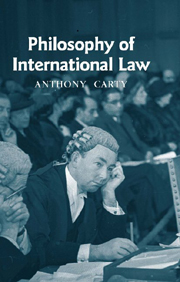Book contents
- Frontmatter
- Contents
- Preface and Acknowledgments
- 1 What Place for Doctrine in a Time of Fragmentation?
- 2 Continuing Uncertainty in the Mainstream
- 3 International Legal Personality
- 4 The Use of Force
- 5 American Legal Cultures of Collective Security
- 6 Marxism and International Law
- 7 Resistances to the Neoliberal International Economic Order
- 8 From an Order of Fear to One of Respect
- Index
7 - Resistances to the Neoliberal International Economic Order
Published online by Cambridge University Press: 12 September 2012
- Frontmatter
- Contents
- Preface and Acknowledgments
- 1 What Place for Doctrine in a Time of Fragmentation?
- 2 Continuing Uncertainty in the Mainstream
- 3 International Legal Personality
- 4 The Use of Force
- 5 American Legal Cultures of Collective Security
- 6 Marxism and International Law
- 7 Resistances to the Neoliberal International Economic Order
- 8 From an Order of Fear to One of Respect
- Index
Summary
Diagnosis of the Relationship of Hegemonic Capitalism to Democracy, the Rule of Law and Human Rights
Coercive international order, cosmopolitan values, and economic interest
Given a picture of contemporary international society, which is dominated by the US, whose central significance for a philosophy of international law has been presented in the last two chapters, the question arises how to understand the same subject as it is presented by contemporary American scholars, both lawyers and political philosophers. Such authors as Allen Buchanan and David Golove, Fernando Teson, and, of course, John Rawls himself, present a closely reasoned agenda for what they call the democratization of international society, setting out conditions for the legitimacy of states, which are marked by human rights standards that can themselves trigger grounds for forceful intervention by other states. The central point of these reflections on the need for a morality of international law is that a critical reflection is made of the state's claim to legitimacy in international law by virtue of the mere fact of control. As Buchanan and Golove put it, ‘according to some normative views, including Rawls's in the Law of Peoples, only those states that meet the requirements of transnational justice, understood as respect for individual rights, are entitled to enjoy the rights and privileges of members of good standing of the international community.’ There are nuances in these debate as to whether so-called illiberal regimes should be tolerated, or whether pragmatic considerations should weigh against democratic regimes declaring war on authoritarian regimes. There is no doubt that this school of thinking is very pertinent and stimulating for international law.
- Type
- Chapter
- Information
- Philosophy of International Law , pp. 193 - 220Publisher: Edinburgh University PressPrint publication year: 2007



